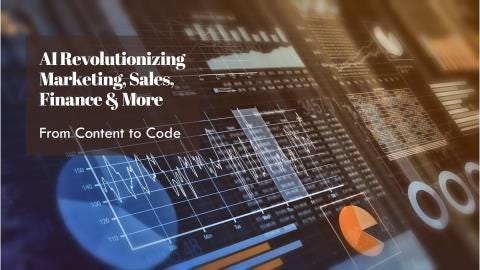From Content to Code: How AI Is Changing the Game in Marketing, Sales, Finance & More

The AI revolution is happening now, and it’s reshaping industries in ways we never thought possible. If your business isn’t on board yet, you’re already a step behind the competition.
Artificial Intelligence (AI) is no longer a concept of the distant future — it’s already transforming the world of business. From marketing to sales, finance, tech, and even content creation, AI is becoming a key driver of innovation and efficiency. AI-powered tools and platforms are not just automating tasks; they’re enhancing decision-making processes, improving customer experiences, and driving business growth.
In this blog, we will break down how AI is impacting five major sectors: marketing, content creation, sales, finance, and technology. With practical examples, number calculations, and insights, we’ll explore how businesses can use AI to stay competitive in a rapidly evolving market.
1. AI in Marketing: The Power of Personalization and Predictive Analytics
Marketing is where AI is making one of the most significant impacts, particularly in personalization, predictive analytics, and automation. AI helps marketers analyze vast amounts of consumer data and predict future behavior, ensuring that marketing campaigns are more targeted, efficient, and personalized.
Real-World Example:
Coca-Cola has been utilizing AI for years to analyze social media data, helping the brand create more personalized content. In 2017, they launched an AI-powered chatbot on Facebook Messenger that allowed customers to design their own bottles. This initiative drove massive engagement and personalized the experience for each customer.
Stat Spotlight:
AI-driven marketing personalization can increase customer engagement by 74% and conversion rates by 28%. A study by Adobe found that businesses using AI for marketing were 20% more efficient and generated up to 30% more revenue .
How It Works:
AI tools like HubSpot’s predictive lead scoring and Salesforce’s Einstein AI use machine learning to analyze customer behavior and predict which leads are most likely to convert. This allows marketers to focus on high-value prospects and create content that resonates with their needs.
Practical Takeaway:
For companies that want to implement AI in marketing, the first step is integrating AI-powered CRM systems and data analytics tools. These systems will allow marketers to better segment audiences, automate repetitive tasks, and make data-driven decisions, leading to higher returns on marketing investments.
2. AI in Content Writing: Producing High-Quality Content at Scale
In the world of content writing, AI tools are becoming indispensable. Whether it’s generating blog posts, ad copy, or product descriptions, AI-driven tools like ChatGPT and Jasper are enabling businesses to scale their content production without sacrificing quality.
Example in Action:
The Associated Press (AP) uses AI to write thousands of financial reports, freeing up journalists to focus on more in-depth, analytical work. AI-generated reports have increased AP’s coverage by tenfold, making it a perfect example of how AI can enhance productivity without compromising quality.
Stat Spotlight:
AI-generated content is becoming a $20 billion industry. According to Gartner, by 2026, more than 30% of companies will use AI tools for content generation. Businesses using AI for content creation have reported a 40% reduction in production time .
The Technology Behind It:
AI content generators like Jasper or Writesonic work by analyzing large datasets to generate human-like text. These tools can help with everything from drafting articles to generating product descriptions or creating personalized marketing emails.
Practical Takeaway:
For businesses looking to scale their content marketing, AI can significantly reduce the time it takes to produce high-quality content. This not only increases efficiency but also allows companies to maintain a consistent voice across multiple platforms.
3. AI in Sales: Automating and Enhancing the Sales Process
Sales teams are using AI to automate routine tasks, improve decision-making, and predict customer behavior. Sales enablement tools powered by AI can help sales reps identify high-potential leads, predict customer needs, and even automate follow-ups, allowing them to focus on closing deals.
Real-World Example:
Zendesk’s AI-powered sales assistant automates the process of responding to customer queries, scheduling follow-ups, and analyzing customer behavior. The result is a 25% increase in lead conversions and a 15% improvement in sales productivity.
Stat Spotlight:
Companies using AI in sales see a 50% increase in productivity and a 40% improvement in lead generation accuracy. Research from McKinsey suggests that AI-driven sales enablement tools can increase sales performance by up to 30% .
AI Tools in Sales:
Platforms like Salesforce Einstein use machine learning and AI-driven algorithms to analyze customer data, predict customer behavior, and recommend next best actions for sales teams. This not only helps close deals faster but also improves the accuracy of sales forecasts.
Practical Takeaway:
For sales teams, AI can automate time-consuming tasks like lead qualification, follow-ups, and scheduling, freeing up time for more critical activities like building relationships with clients. Companies should invest in AI-driven CRM systems to optimize their sales funnel and improve team performance.
4. AI in Finance: Optimizing Risk Management and Decision Making
AI is having a profound effect on finance by automating complex tasks, improving risk management, and speeding up decision-making processes. From fraud detection to algorithmic trading, AI is providing financial institutions with tools to manage large datasets and make smarter decisions.
Example in Action:
JP Morgan Chase developed a program called COiN (Contract Intelligence), which uses AI to interpret commercial-loan agreements. COiN can review thousands of legal documents in seconds, reducing the time it takes to complete certain processes from 360,000 hours of human work to just a few seconds.
Stat Spotlight:
AI-driven tools in finance have been shown to reduce operational costs by up to 20%. The use of AI in risk management has helped companies identify potential threats 10x faster than traditional methods .
How AI Is Changing Finance:
AI is used for high-frequency trading, analyzing market data in real time to execute trades faster and more efficiently than humans. Companies like BlackRock use AI to manage billions in assets, identifying market patterns that would be impossible for a human to detect.
Practical Takeaway:
Incorporating AI into finance can help businesses improve everything from fraud detection to asset management. Financial institutions that leverage AI tools are able to stay ahead of market trends and optimize their decision-making processes for better returns.
5. AI in Technology: Automating Coding and Software Development
In the tech sector, AI is streamlining software development by automating coding, testing, and debugging processes. AI-powered tools are helping developers write better code, faster, and with fewer errors, making development cycles shorter and more efficient.
Example in Action:
GitHub Copilot, powered by OpenAI, assists developers by suggesting code as they type. This not only speeds up the development process but also helps prevent bugs and errors that might otherwise slip through the cracks.
Stat Spotlight:
Developers using AI tools report a 55% reduction in time spent on debugging and a 20% increase in overall productivity. By 2025, AI-powered software development is expected to be a $50 billion industry .
AI in Software Development:
AI algorithms can automatically generate code, suggest improvements, and even identify bugs before they become an issue. This is helping developers move faster, build more reliable software, and reduce overall costs.
Practical Takeaway:
For tech companies, adopting AI tools like Copilot can streamline development and ensure more efficient workflows. By automating repetitive coding tasks, developers can focus on more complex, creative work, leading to faster releases and better software.
Final Thoughts: The Future Is AI-Driven
AI is not just a tool — it’s a transformative force reshaping entire industries. From marketing and sales to finance and technology, companies that embrace AI will be better positioned to succeed in an increasingly competitive market. The key is understanding how to implement AI effectively and using it to drive innovation, improve efficiency, and ultimately boost business growth.
AI isn’t just an option anymore — it’s the edge your business needs to stay ahead. Don’t wait for your competitors to outpace you. The future is AI-driven, and the time to adopt is now.
